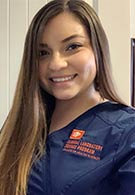Meet Our Students - Celida Sanchez - Learning How to Save Lives

Major: Clinical Laboratory Science
Are you a first-generation college student? If so, please share with us why you were inspired to go to college and why you picked UTEP.
I am not a first-generation college student. However, I am the first in my family to pursue a degree in a medical field. I was inspired to pursue a college degree by my mother, who always taught me the importance of working hard to achieve my dreams and being independent. I chose to attend UTEP because of the affordable tuition; I had to pay out of pocket for a few years. Since I was able to also live at home with my mom and not have to pay for housing, this was more doable. One of my favorite things about this campus is the diversity it has and the great variety of degrees it provides for students.
What sparked your interest in the Clinical Laboratory Science Program?
When I was 18 years old, I took a medical microbiology and pathology course, which sparked my interest in this field. I remember looking at parasites under the microscope and just being so amazed. Being able to save lives and care for other people is something that I know I was meant to do. Completing the laboratory work behind the diagnoses of diseases is the highlight of this career. I get to learn about the body in a microscopic way, and it is truly remarkable. One of the best things about this program is that there are high rates of employment, which was my ultimate goal. I wanted to find a career that I was passionate about and that made me look forward to going to work.
What has been your greatest challenge academically so far, and what did you do to overcome it?
Learning how to manage time was probably my biggest challenge. As mentioned before, I was working many hours while remaining a full-time student. Sometimes, I would go to work, leave to attend class, and then go back to work. Then, I’d go back home and complete assignments and study for my courses. When I began the program, I knew I wanted to dedicate all my time and effort to it in order to succeed. My first semester in the program was overwhelming. I had to adjust to the amount of material presented, studying, and having time for myself and my family.
I was very fortunate to get help from my professors in learning how to manage my time. I began making to-do lists, calculating a certain number of hours for each course, and waking up early but also sleeping early in order to get good rest. This was my secret to success in this program.
What has been the most interesting experience you have had in the CLS Program?
There are many memorable moments I have had in this program, like the first time I ever had to perform a phlebotomy. As a child, I was so terrified of needles. When I first heard I was going to have to perform a phlebotomy myself, I could not believe it. I did not know how to prepare for it mentally. Then, I did it for the first time and was left speechless, like wow, I really just did that! Or the time when I first got to see red blood cells and white bloods cells under a microscope. It was one of the most amazing things to see, but I may sound biased because hematology is my favorite subject. Even now, when I look at my electrophoresis gels and they turn out well, I still amaze myself.
I am currently doing my clinical rotations; I have been to two hospitals thus far, and I have never loved my career more. One of the highlights of my rotations was that I actually got to shadow my preceptors and the pathologist on two bone-marrow procedures. In both rotations, I was asked to consider applying, pending graduation! Moments like those help you realize that all the tears, sweat, and time put into this degree is worth it.
Please share what you have learned in your clinical internship experience that you feel has prepared you for your future career.
There are many life lessons I have learned in my clinical internship that are helping to shape me into the best professional I can be. The first is the importance of always being willing to do more. Being willing to do more allows you to learn more. We all have our set responsibilities, but it’s important to not limit ourselves and to always offer help, and in the end, it helps you gain more knowledge and experience. Another is to remain calm. At times, things can get hectic while working in the field. The best advice I was given was to always remain calm because panic can lead to errors. Lastly, be open to constructive criticism. If you are not open to understanding what is being done wrong, you will never get better.
What advice would you give to a student thinking about studying clinical laboratory science?
This program is challenging. It requires time and dedication and, most importantly, passion. The passion the professors have for their careers is what motivated me to succeed in this program. Never be afraid to ask questions or make mistakes because you learn from them. At times, it may be overwhelming, but it’s important to try your best to not overstress. If you need to, step away from the study material, then take a deep breath and continue. Most importantly, learn how to manage your time. It is the ultimate secret to succeeding in this career. You will be so amazed when you realize the potential that you never knew existed in you.
Go Miners!
For more information about the Clinical Laboratory Science Program, please visit: www.utep.edu/chs/cls/.




